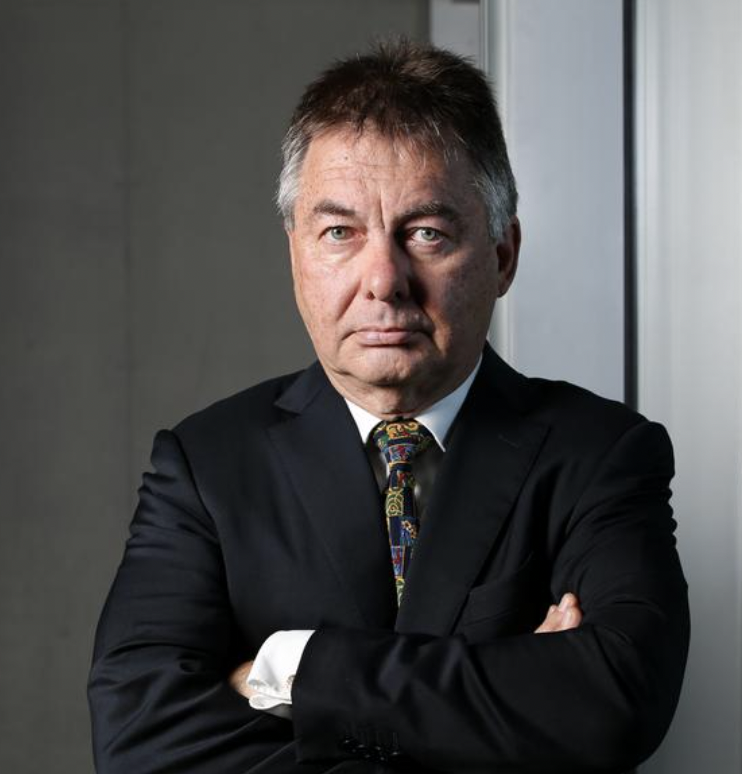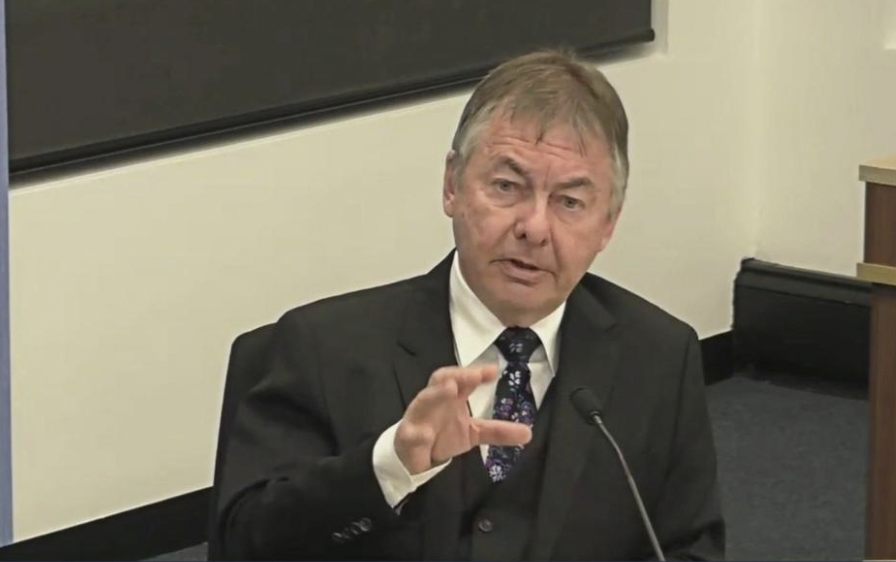Andrew L. Urban.
The Magna Carta meets the ACT’s legal system on the Sofronoff express in what promises to be a historic and relevant journey into pretty wild legal territory. That territory is strewn with the carcasses of legal reputations, legal rules and political operatives. Fasten your seat belts, it’s going to be a bumpy ride, as Margo Channing (Bette Davis in All About Eve) might say.
The Sofronoff express will arrive in Sydney at the annual Robin Speed Memorial Lecture for the Rule of Law Education Centre in the evening of Thursday, June 13, 2024. The date is chosen to mark the anniversary of the signing of the Magna Carta in 1215, declaring the sovereign to be subject to the rule of law (hence, “nobody is above the law”). It takes the form of Walter Sofronoff KC’s address on the rule of law in Australia. The lecture is named in honour of the founder of Speed and Stracey Lawyers and the Rule of Law Education Centre, Robin Speed OAM, who passed away in February 2023. (Paul Kelly, The Australian’s Editor-at- Large gave the inaugural Robin Speed Memorial Lecture in 2023 on the Voice to Parliament.)
According to its website, “The Rule of Law Institute of Australia is an independent, politically non-partisan, not-for-profit body formed to uphold the rule of law in Australia. The Institute aims to promote discussion on the importance of the principles which underpin the rule of law.”
The Rule of Law Institute can be said to be a descendant of the Magna Carta. The Institute launched the annual Robin Speed lectures with a clear objective: “The purpose of this Lecture will be to provide an inspirational reminder of the contribution made by Robin Speed in promoting and protecting the rule of law in Australia.” Speed noted that “The job cannot be left to the courts, where they have limited powers of intervention and any intervention may be too late.”
Sofronoff’s father was a Cossack from Siberia who fled Russia in the 1930s. The family ended up in Australia and in 1977, the young Sofronoff was called to the Bar and took silk in 1988. He served as a member (1980–82), vice-president (1992–94) and president (1994–96) of the Bar Association of Queensland Committee.

Walter Sofronoff KC
(Courier Mail photo)
Sofronoff conducted the inquiry in the ACT into the circumstances surrounding the failed criminal case against Bruce Lehrmann on a charge of raping Brittany Higgins – and the accompanying allegations of political interference, which he found to be false.
His report on the scandalous Lehrmann rape prosecution and all who sailed in her has had immense consequences including the resignation of Shane Drumgold KC, the ACT’s Director of Public Prosecutions, who later ran a challenge to the report that is best described as partly successful.
The Rule of Law Institute puts it this way: “There will always be different interpretations placed on decisions that are not clear cut. But it is important to remember these key points:
“Drumgold failed to strike down Sofronoff’s finding that he had misled Chief Justice Lucy McCallum of the ACT Supreme Court.
“He also failed to strike down a finding that he directed a junior lawyer to draw up a misleading affidavit.
“That, however, is not the end of the story.
“After Sofronoff found Drumgold had made baseless accusations about Coalition senator Linda Reynolds, the ACT paid the senator $90,000 and issued an apology to settle defamation proceedings over Drumgold’s statement.
One of the most surprising aspects of the affair involves the response of the ACT government.
“If anyone knows about real and potential threats to the rule of law it is Walter Sofronoff,” comments Chris Merritt, vice-president of the Rule of Law Institute of Australia. “Until recently, he had experienced the principles underpinning the rule of law from a position on the bench.
“But now, due to the behaviour of the government of the ACT, he has first-hand experience of what can happen when those in authority disregard important doctrines such as the presumption of innocence, equal application of the law and the right to a fair trial.
“Last year, the ACT government accused him of breaching the territory’s Inquiries Act – a criminal offence – during his inquiry into the aborted rape trial of Bruce Lehrmann in the ACT Supreme Court. If there were any substance to that accusation, Sofronoff would have been prosecuted by now and judged for his conduct against the requirements of the ACT Inquiries Act.

Walter Sofronoff KC
“This Act is the rule book that outlines in exhaustive detail what must be done and what must not be done by those conducting independent inquiries in the ACT. The failure to prosecute Sofronoff suggests that the accusation is baseless and the government has realised he would be exonerated if he were brought before a court. Instead, Sofronoff is a victim of forum shopping.
“He is now the subject of a corruption inquiry by the ACT Integrity Commission which is a non-judicial tribunal that is not governed by the rules of evidence, which uses a vaguely defined test for corruption and which is administered by a former academic who, with the best will in the world, has never held judicial office.
“The government’s accusation against Sofronoff is without merit. He made available copies of his report to two journalists on an embargoed basis to ensure his findings could be accurately reported. There is nothing in the Inquiries Act that makes this unlawful.
“I have no idea what he is planning to say about the state of the rule of law, but after what has happened to him, the dinner on June 13 is unlikely to be boring.”
Before the ACT inquiry, he was appointed Commissioner for the Commission of Inquiry into Forensic DNA Testing in Queensland, which found a controversial DNA method was fundamentally flawed and may have resulted in offenders escaping conviction over a period of nine years, putting the cat among the Queensland pigeons. The ACT pigeons were next with the Higgins/Lehrmann inquiry.
Among those attending Sofronoff’s lecture will be former prosecutor turned defence barrister, Margaret Cunneen SC, President of the Rule of Law Education Centre and the subject of an aggressive, unwarranted investigation by the NSW ICAC in 2015, which ended with the ICAC thoroughly discredited for exceeding its authority.
The Speed Memorial Lecture is a timely opportunity to take stock of how strong and how well respected is the rule of law in Australia. Including in Australian courts and institutions. A report just published by Flinders University legal academic Dr Robert Moles shows one example of how some in the legal system ignored the rule of law, keeping a man in jail for 40 years after a murder conviction that is essentially unlawful. South Australia’s Court of Criminal Appeal dismissed Derek Bromley’s appeal and doing so, the Court “fundamentally failed to pay due regard to the rule of law and to the well-established principles governing criminal appeals. The principles espoused in the Bromley (appeal) decision are not only contrary to established authority but have never before appeared in any legal judgment in Australia, Britain or Canada.”
Another example (among others) is the refusal of successive Tasmanian Attorneys-General to accede to legally supported demands from lawyers and others, including a former Attorney-General, to hold a commission of inquiry into the 2010 murder conviction of Sue Neill-Fraser.
The rule of law would be at risk, especially its fundamental element – freedom of expression – under any new regulations to restrict what the Government calls mis or dis information. As Human Rights Commissioner Lorraine Finlay pointed out (The Australian, 24 August, 2023), “There are inherent dangers in allowing any one body – whether it be a government department or social media platform – to determine what is and is not censored content. The risk here is that efforts to combat misinformation and disinformation could be used to legitimise attempts to restrict public debate and censor unpopular opinions.”
Finlay warns about the proposal: “The draft bill aims to give the Australian Communications and Media Authority increased powers to combat online misinformation and disinformation, but in a way that does not find equilibrium between censorship of objectively untrue content and protection for freedom of expression.”

I do not claim to be a legal expert , but, I feel this is a witchhunt of His Honour Sofronoff, S.C. for not doing what the ACT female and Leftie clique expected him to do. In an era where many judges now break the rules and are swayed by their prejudices he stands out as a learned , honest , impartial judge who has my respect. I wish I could be at the lecture ! I am deeply concerned by actions of the Albanese government, especially the so -called Misinformation and Disinformation Law which I see is censorship a la Soviet . I am concerned that the new female Governor-General is a Republican. I have never been a fan of the Royals, but, I see dangers to our freedoms if we become a republic, so, I have joined the Monarchists. The wonderful Australia of my youth has suffered , and, will continue to suffer because of mass migration from cultures so different to ours. In a few years, just as Pauline Hanson predicted in 1996, we will be a minority. The people who put her in jail are now pressing the panic button . Too late! The damage to our freedoms and European culture is irrepairable because we are being outbred !
I agree wholeheartedly with the above comments, our world, and indeed Australia is no longer the happy healthy place it once was. I cannot watch the news anymore, as we slowly decline into hades.
These virtuous legal leaders could also discuss the chewing of the faces of lovely little children by unmuzzled police dogs. As approved by our dear top police hierarchy – this action is within guidelines as to the use of dogs on children . Australia 2024. The police union and rank and file police must also approve of face chewing dogs ? A decent police person would immediately shoot the face chewing dog between the ears . Three drunk police bashed little John Pat to death without police union complainant – in fact,with their unions support. That pretty well describes the character of Australian police. So where are the decent police hiding ?
Great advice Andrew, fasten your seat belts. And as a cropduster pilot for a little while, before takeoff was yank on the straps as tight as you can, then tighten them again. That procedure might have conributed to saving my life. My crash helmet had abrasions from contact with the crash bars in the cockpit. Facing potential death on a daily basis is character building, thats why I support the ADF, who might have to govern this country in the near future. Owen.